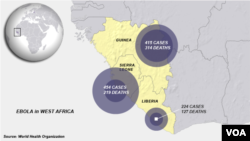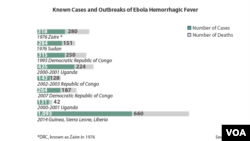Nigerian officials say a man who died Friday in Lagos tested positive for the dreaded Ebola virus.
Nigeria becomes the fourth West African country to confirm the presence of Ebola, which has killed hundreds of people this year in Guinea, Sierra Leone and Liberia.
Nigeria's health minister, Onyebuchi Chukwu, said the 40-year-old man became sick after arriving Tuesday on a flight from Monrovia, Liberia. He said the patient was quickly taken to a hospital and isolated after displaying Ebola-like symptoms.
"He presented with fever, vomiting and diarrhea on arrival at the airport. The port health division of the federal ministry of health quickly isolated the passenger and quickly transported him straight to the hospital avoiding contact with the general public," said Chukwu. "The patient was subject to a thorough medical evaluation."
Blood smaples confirm virus
The minister said blood samples sent to various laboratories confirmed the patient had the virus.
A VOA Hausa service reporter in Lagos identified the deceased man as a Liberian national, Patrick Sawyer.
On Friday, the World Health Organization said the Ebola epidemic now has killed 660 people in West Africa -- 314 in Guinea, 219 in Sierra Leone and 127 in Liberia.
Containment efforts
Nearly 1,100 Ebola cases have been reported, but that number could rise quickly if the virus begins spreading in Nigeria -- especially in Lagos -- home to more than 17 million people.
The disease has spread despite containment measures by regional health officials, including the isolation of suspected Ebola patients and warnings to avoid any physical contact with those infected by the virus.
Cultural practices such as caring for patients at home and family burials for those killed by the disease have undermined containment efforts.
There is no cure or vaccine for Ebola. Its symptoms include fever, vomiting, diarrhea and bleeding from the eyes, ears, mouth and nose.







